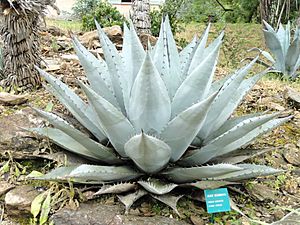Agave havardiana facts for kids
Agave havardiana is a fascinating plant species. It grows naturally in the Big Bend area of western Texas. You can also find it in parts of Chihuahua and Coahuila in Mexico. This plant likes to live on grassy or rocky slopes and in woodlands. It usually grows at elevations between 1,200 and 2,000 meters (about 3,900 to 6,500 feet) high.
Quick facts for kids Agave havardiana |
|
|---|---|
 |
|
| Agave havardiana specimen in the Jardin d'oiseaux tropicaux, La Londe-les-Maures, France. | |
| Conservation status | |
| Scientific classification |
|
| Kingdom: | Plantae |
| Clade: | Tracheophytes |
| Clade: | Angiosperms |
| Clade: | Monocots |
| Order: | Asparagales |
| Family: | Asparagaceae |
| Subfamily: | Agavoideae |
| Genus: | Agave |
| Species: |
A. havardiana
|
| Binomial name | |
| Agave havardiana |
|
| Script error: The function "autoWithCaption" does not exist. | |
Script error: No such module "Check for conflicting parameters".
Meet the Havard Agave
The Havard Agave is a unique plant. It grows low to the ground. Its leaves form a beautiful circle called a rosette. Sometimes, it sends out small shoots from its base. These are called suckers. But unlike some other agave plants, it doesn't form huge groups or "colonies."
What Does It Look Like?
The leaves of the Havard Agave can grow quite long. They can be up to 70 centimeters (about 28 inches) in length. These leaves have small teeth along their edges. They also have a sharp point at the very tip.
When it's time to flower, a very tall stalk grows from the center of the plant. This stalk can reach up to 7 meters (about 23 feet) high! Yellow to yellow-green flowers bloom on this tall stalk. After the flowers, the plant produces dry, oblong fruits. These fruits can be up to 6 centimeters (about 2.4 inches) long.
Why It Needs Our Help
Sadly, the Agave havardiana is facing some challenges. Its natural home is shrinking. This is mostly because land is being used for cattle ranching. When its habitat is lost, it becomes harder for these plants to survive and thrive. Protecting these special places helps keep the Havard Agave safe for the future.
 | Audre Lorde |
 | John Berry Meachum |
 | Ferdinand Lee Barnett |


